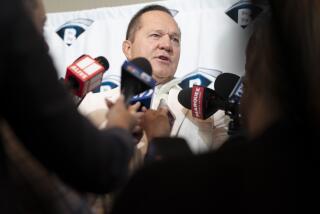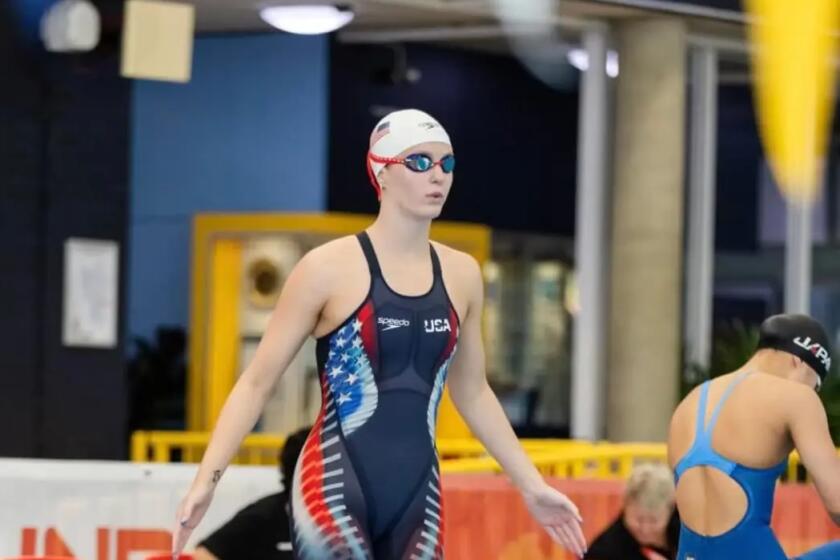Surplus of Baseball Free Agents Could Cause Decline in Salaries
- Share via
With the strike ended and major league baseball players reporting to reopened training bases this week, San Diego-based agent Tony Attanasio tried Monday to generate business for some of his unsigned clients.
“I called six general managers and thought I was listening to a tape recording because they all followed the party line,” he said.
“The message was the same: ‘The clubs lost $700 million (in revenue because of the strike), the money is not there, we can’t afford to pay your guys, you’re asking too much.’
“I mean, I hadn’t even asked for a nickel, hadn’t even put a proposal on the table, and I was being told I’m asking too much.
“The clubs have their script and some of it may be realistic, but I also think it’s punishment time for the players.”
More than 800 unsigned players on major league rosters and more than 200 free agents are looking for employment at a time when clubs say their accounts have been drained.
“I’d be greatly surprised if there’s the normal feeding frenzy,” said Lee Thomas, the Philadelphia Phillie general manager. “I mean, I have no idea where the clubs would be getting their money.
“Some of the big boys may still have what they had before, but the money I had six months ago isn’t there now. I’m probably going to have to pass on players I might otherwise have been interested in and try to go at it another way.”
As clubs lean toward younger, less-expensive players, agents fear that many veteran players will go unsigned, paying the price for an eight-month work stoppage that will lead to 921 games having been canceled since Aug. 12.
In addition, the already burgeoning free-agent market is likely to grow even larger Friday, when clubs are required to tender contracts to players eligible for salary arbitration.
In many cases, however, it’s anticipated that the clubs will choose not to tender, allowing those players to become free agents rather than risk the expensive uncertainty of arbitration.
“I expect their plan is to flood the market so that there’s more supply than demand,” Attanasio said. “That’s a given.”
There’s already a handsome array of free agents. Among them:
Starting pitchers: Orel Hershiser, Kevin Brown, Danny Darwin, Bill Swift, Bob Tewksbury, Todd Stottlemyre, Bobby Witt, Tim Belcher, Zane Smith, Dave Stewart, Frank Viola, Bob Welch, Terry Mulholland and Steve Ontiveros, last season’s earned-run average leader in the American League.
Relief pitchers: John Franco, Jeff Russell and Doug Jones.
Catchers: Pat Borders, Benito Santiago and Mike Macfarlane.
Infielders/outfielders: Larry Walker, Mark Grace, Andy Van Slyke, Mickey Tettleton, John Kruk, Jeff Blauser, B.J. Surhoff, Kevin McReynolds, Vince Coleman, Mariano Duncan and Terry Pendleton.
Said Dave Dombrowski, general manager of the Florida Marlins: “Some players are still going to get big dollars. In general, however, I have to think the strike will have a major impact on salaries.”
The Marlins were significantly affected by the strike and associated events of the last eight months.
They had reached tentative agreements on five-year contracts with two Montreal Expo stars--Marquis Grissom for $27.5 million and Ken Hill for $25 million--at a time when both appeared to be free agents under the right of first refusal provisions of the salary cap system.
When that system collapsed, so did the deals and the free-agent eligibility of Grissom and Hill, who remain with the Expos, eligible only for arbitration.
Both may still leave. Montreal General Manager Kevin Malone said the absence of a new bargaining agreement with tighter cost controls will prevent him from keeping his talented team together. Walker is leaving as a free agent, and Malone said he expects to trade Grissom, Hill and John Wetteland for prospects, lowering his $18.7-million payroll to perhaps $12 million.
“There’s going to be a surplus,” Malone said. “There are going to be good deals available. We’ll get production at a good price.”
Veteran agent Tom Reich agreed with Malone’s “buyer’s market” theory. He also agreed that strike-related losses will drive down salaries.
“They’ll have a song for you and use it as justification in any situation,” Reich said. “They’ll tell you salaries will be down next year too, but the key to how big the pie will be is how people behave restoring the game.”
Players lost 28% of their salaries last year because of cancellations and will lose 11% this year. Some might be shut out entirely.
In the wake of the injunction ruling restoring arbitration and free-agent bidding, the owners’ Player Relations Committee sent a memo to the clubs that revived memories of collusion. It included a list of nine talking points for club officials, one of which read:
“Without a collective bargaining agreement and crippled by strike-related losses, clubs will be unable to offer huge new contracts to free agent players. In some cases, they won’t be able to sign free agents at all.”
Meantime:
--The union has leased a training facility in Homestead, Fla., for the free agents. It will open today, with union officials Mark Belanger and Tony Bernazard in charge.
--Management and union lawyers finalized a back-to-work agreement Monday, including the establishment of free-agent and arbitration procedures. Arbitration-eligible players offered that process by their clubs Friday have until the 15th to accept or reject. If they accept, salary figures will be exchanged April 28, with hearings in May. Those players are deemed signed when they accept the offer and will be paid before their hearings at the rate they were tendered or the arbitration figure submitted to the club.
--The free-agent and arbitration status of several players was affected by lost service time in August and September, but the service-time issue will be resolved ultimately in a bargaining settlement and is not part of the back-to-work agreement.
Amid the complexities of the players’ return and the uncertain market, the union still has a grievance pending with arbitrator George Nicolau that could make all players free agents based on the union’s contention that the clubs made illegal tenders in December, unilaterally changing provisions in the standard contract.
In addition, the back-to-work agreement and the players’ unconditional offer to return could totally, or in part, blow up today if the owners obtain a stay of the injunction order pending an expedited appeal. Management lawyers will ask the 2nd U.S. Circuit Court of Appeals for both.
Said union lawyer Lauren Rich: “Anyone who has followed the last eight months would be foolish to predict what might happen.”
* IT’S A HIT: Baseball-related businesses hail end of strike. D2
More to Read
Go beyond the scoreboard
Get the latest on L.A.'s teams in the daily Sports Report newsletter.
You may occasionally receive promotional content from the Los Angeles Times.










